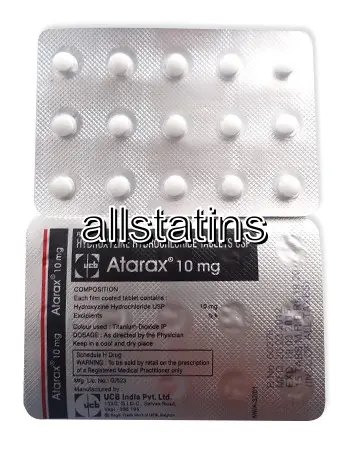| Package | Dosage | Price | Price per Dose | |
|---|---|---|---|---|
| Dosage: 10mg | ||||
| 360 pill | 10mg | $238.58 | $0.66 | |
| 180 pill | 10mg | $132.74 | $0.74 | |
| 120 pill | 10mg | $114.80 | $0.95 | |
| 90 pill | 10mg | $91.48 | $1.02 | |
| 60 pill | 10mg | $68.15 | $1.13 | |
| 30 pill | 10mg | $39.45 | $1.31 | |
| Dosage: 25mg | ||||
| 360 pill | 25mg | $444.89 | $1.24 | |
| 240 pill | 25mg | $319.31 | $1.33 | |
| 180 pill | 25mg | $261.91 | $1.45 | |
| 120 pill | 25mg | $182.97 | $1.52 | |
| 90 pill | 25mg | $147.09 | $1.63 | |
| 60 pill | 25mg | $107.62 | $1.79 | |
| 30 pill | 25mg | $59.18 | $1.97 | |

Hydroxyzine Description
Introduction to Hydroxyzine
Hydroxyzine is a versatile medication commonly used in the treatment of allergic reactions, anxiety, and sleep disorders. As a first-generation antihistamine, it works by blocking the effects of histamine, a substance in the body that causes allergy symptoms. It is often prescribed for conditions such as hives, contact dermatitis, and allergic rhinitis. Additionally, hydroxyzine has sedative properties, making it useful for short-term management of anxiety and insomnia. The medication is available in various forms, including tablets, capsules, syrup, and injectable solutions, providing flexibility for different patient needs.
How Does Hydroxyzine Work?
Hydroxyzine functions primarily as an antihistamine. By inhibiting histamine H1 receptors in the body, it effectively reduces allergy symptoms such as sneezing, runny nose, watery eyes, and itching. Its sedative effects are a result of its ability to cross the blood-brain barrier and influence central nervous system activity. This calming effect helps alleviate anxiety and promote sleep in individuals with insomnia. Because of its dual action, hydroxyzine is often considered both an antihistamine and an anxiolytic medication, making it valuable in situations where allergy relief and anxiety reduction are needed simultaneously.
Benefits and Uses of Hydroxyzine
Patients often find hydroxyzine beneficial for managing a wide range of conditions. Its effectiveness in controlling allergic responses is well recognized. The medication provides quick relief from symptoms of allergic skin conditions and respiratory allergies. For anxiety and sleep issues, hydroxyzine is preferred when short-term relief is desired, particularly because it has a relatively quick onset of action. Moreover, it is sometimes used to help with nausea and vomiting related to surgery or medical procedures. In some cases, healthcare providers use it to reduce symptomatic itching caused by various dermatological conditions. The convenience of multiple administration options makes it adaptable for different patient preferences and needs.
Possible Side Effects and Precautions
Like many medications, hydroxyzine may cause side effects. Common ones include drowsiness, dry mouth, and dizziness. Because of its sedative properties, it can impair alertness and coordination, so patients are advised to avoid operating machinery or driving until they know how it affects them. Less commonly, some individuals might experience blurred vision, constipation, or urinary retention. Allergic reactions are rare but can occur; these may include swelling, rash, or difficulty breathing. It is particularly important for pregnant or breastfeeding women to consult a healthcare provider before using hydroxyzine. Patients should inform their doctor of any existing health conditions or medications to avoid adverse interactions.
Precautions and Usage Guidelines
Hydroxyzine should be taken exactly as prescribed by a healthcare professional. Typically, it is used for short-term relief, especially in the case of anxiety or sleep disturbances. Patients are advised not to increase the dose without medical approval, as higher doses can lead to more severe sedation or adverse effects. It is recommended to take the medication with food or water to reduce gastrointestinal discomfort. Because of its sedative effects, caution should be exercised when performing activities requiring alertness. Patients should also be aware of potential interactions with other CNS depressants, such as alcohol or sedative medications, which can enhance sedation and increase risk of side effects. If a dose is missed, it should be taken as soon as remembered unless close to the time of the next scheduled dose.
Conclusion
Hydroxyzine remains a reliable treatment option for allergies, anxiety, and sleep problems. Its dual action provides quick symptom relief and calming effects, making it a versatile medication in many clinical settings. However, it must be used responsibly, considering its sedative potential and possible side effects. Patients are encouraged to follow medical advice strictly and report any unusual reactions. With appropriate use, hydroxyzine can significantly improve quality of life for those dealing with allergic and anxious conditions.
